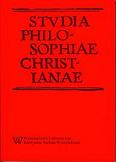O pytaniach filozoficznych i ich rozstrzygalności
On philosophical questions and their decidability
Author(s): Anna BrożekSubject(s): Philosophy
Published by: Wydawnictwo Naukowe Uniwersytetu Kardynała Stefana Wyszyńskiego w Warszawie
Keywords: question analysis; decision procedure; theodicy; decidability
Summary/Abstract: In the first part of the paper, a theoretical one, the concept of decidability and the essence of philosophical questions is discussed. The following definitions of “decidability” are proposed: A question Q is decidable, iff there is known procedure P such that application of P leads to deciding of Q. A question Q is decidable with respect to the procedure P, iff when a person O applies P, O decide if Q, on the condition that: To decide a question Q means to give a true and direct or true and correcting answer to Q, or (pragmatically): To decide practically a question Q means to accept one of the direct or correcting answers to Q as a truth. In every discipline there are some decision procedures. Philosophy can be placed somewhere around particular disciplines: it is still connected to those disciplines which have their roots in it. Firstly, in the philosophical conceptual net there are concepts which are the terminological basis of many specific disciplines; philosophical questions are more general than questions of particular disciplines. Secondly, some people see the aim of philosophy in proposing some syntheses of particular disciplines – syntheses which may provide a coherent picture of the world. Thirdly, philosophy is sometimes needed within particular disciplines – especially when there is a need of ordering the conceptual scheme of these disciplines. These special status of philosophy results in the fact that it requires specific decision procedures accepted in philosophy. Since philosophers have different opinions about the class of decision procedures accepted in their disciplines, no wonder that they have also different opinions about which questions are decidable. In my opinion, there are at least two procedures important especially in philosophy: intuition (in its various forms) and analysis. In the second part of the paper, a practical one, analyses of two philosophical questions: the basic question of the theory of cognition and the basic question of theodicy are proposed.
Journal: Studia Philosophiae Christianae
- Issue Year: 45/2009
- Issue No: 1
- Page Range: 7-25
- Page Count: 19
- Language: Polish

